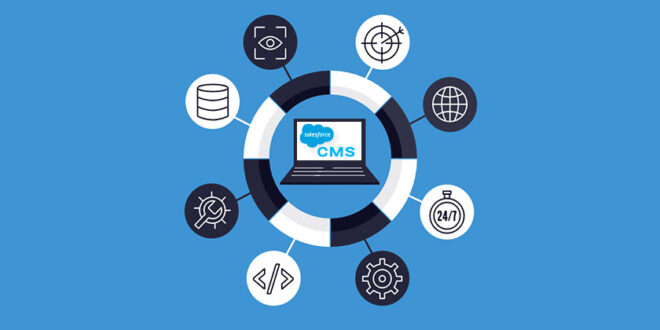Salesforce Content Management System (CMS) is used by many companies to manage content on the Salesforce platform. Many people are confused about what exactly it does and how it works, so let’s break it down and take a look at everything you need to know about Salesforce CMS.
How do you pick the right tool?
Choosing the right tool for your needs is an important decision and one that should not be taken lightly. Take a moment to consider what you’re looking for in a CMS before you start shopping around. Here are some key questions you might want to ask yourself
- What type of content will I need to manage on this site? What is my budget?
- How many people will have access and what level of access do they need?
- Where will this content be managed and by whom?
- Will the website need to integrate with other platforms or systems, such as social media, email marketing, CRM, ERP or accounting software?
- Is there specific functionality you’d like the CMS to offer, such as commenting features or analytics tools?
- Does it matter if the website runs on a mobile device? – Do you need a system that can generate reports or track data metrics?
- Do you already have content management experience, or are you looking for something easy to use?
- What languages does the CMS support?
The History of Content Management

Content management systems have been around since the 1990s. They were originally designed to help people manage the content on their websites, and they have evolved with the internet and digital media over time. Today, content management systems are all about managing digital content.
Content management systems allow you to organize your website’s information into manageable categories or nodes, which is a great way of keeping everything organized.
These days, there are many different types of CMS platforms available to choose from. Some might work better than others depending on what you need them for. The best CMS platform will depend on the size and scope of your site as well as how active it is. In some cases, it can also depend on what type of language it uses – not all content management systems use English. If this is important to you then be sure to look for one that does!
Why choose the Open Source approach?
The first thing to note about CMS for Salesforce is that it’s open source. Open source means that the code of the platform is available and can be altered by anyone. That’s a good thing because it allows developers, IT managers, and other technical people who are interested in the project have input into how it develops. But why would they want to help? The goal of the CMS for the Salesforce development team is to create an enterprise-grade content management system that will meet the needs of large organizations.
The Types of Content Management Systems (CMS) for Salesforce
There are many different types of CMS platforms that you can use with Salesforce. The best option will depend on the type of content you’re managing, your budget, and your level of expertise. Some common content management systems (CMS) include Lightning Components and Sitecore.
These CMSs integrate seamlessly with Salesforce because they were specifically designed to work well together. These options also make it easy for non-technical users to create, manage, and publish their own websites without requiring a developer’s help.
A few other options are Drupal or WordPress which might be more complicated than using an integrated system like Lightning Components or Sitecore but offer more flexibility in how you can set up your site.
When should you upgrade your platform?

Salesforce is a world-leading customer relationship management system and is at the forefront of innovation when it comes to CRM. The company regularly releases new updates and patches, so it’s important that you keep your system up-to-date with the latest versions of software. To help you manage this, there are resources like CMS for Salesforce that can be used to automate updating your system. This will save you time and allow you to focus on other aspects of your business.
Different Types of Solutions that use CMS For Salesforce
- Content Marketing Solutions
- Web Development Solutions
- Social Media Marketing Solutions
- Big Data Analytics Solutions
- E-commerce Solutions * Mobile Applications
- Customer-Relationship-Management Solutions
- ERP (Enterprise Resource Planning) Software Solutions
Is migrating easier than building from scratch?
Migrating is a popular choice because it requires less time and effort than building from scratch. The process can take anywhere from a few hours to a few weeks, depending on the size of the website. However, migrating can be tricky if you don’t have the right tools or know-how.
It’s best to find a company with experience in migration so they can ge

t everything set up correctly. Which CMS is compatible with Salesforce? There are many CMS that works seamlessly with Salesforce and your customers will enjoy all the features offered by both platforms! If your business has needs beyond basic features, one of these might work better for you.
Why pick an enterprise solution?
An enterprise solution is more robust, and scalable and can help you manage your data better. If you’re on a tight budget, don’t worry – there are affordable options that offer some of the same features as enterprise solutions. The key is to research which one will best fit your needs before committing to a purchase.
There are a few differences between CMSs in general, but they all do the same basic function: they create an intuitive interface so users can quickly find content without being overwhelmed by large amounts of information. They also allow you to organize content so that it’s easy for people with different levels of access to find what they need quickly and easily.
What does this mean for me?: CMS tools make it possible to create an intuitive interface so users can find content without being overwhelmed by large amounts of information.
Conclusion
In conclusion, there are many CMSs on the market. Each has its own strengths and weaknesses, but the best CMS for Salesforce is dependent on your company’s needs and requirements. Regardless of which CMS you choose, it is important that you get the support you need when working with a new system. It can be confusing at first and each platform will have its own learning curve. So make sure you take time to research all of your options before choosing one.
 Hi Boox Popular Magazine 2024
Hi Boox Popular Magazine 2024



